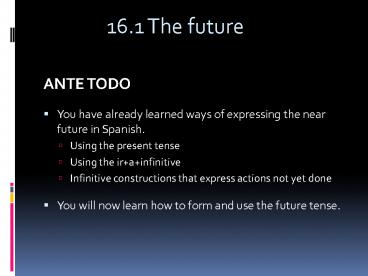ANTE TODO - PowerPoint PPT Presentation
1 / 15
Title:
ANTE TODO
Description:
ANTE TODO You have already learned ways of expressing the near future in Spanish. Using the present tense Using the ir+a+infinitive Infinitive constructions that ... – PowerPoint PPT presentation
Number of Views:97
Avg rating:3.0/5.0
Title: ANTE TODO
1
- ANTE TODO
- You have already learned ways of expressing the
near future in Spanish. - Using the present tense
- Using the irainfinitive
- Infinitive constructions that express actions not
yet done - You will now learn how to form and use the future
tense.
2
- Compare the different ways of expressing the
future in Spanish and English. - Present indicative Infinitive Construction
- Voy al cine mañana. Tengo que ir al cine
mañana. - Im going to the movies tomorrow. I have to go
to the movies tomorrow. - ir a infinitive Future
- Voy a ir al cine. Iré al cine.
- Im going to go to the movies. I will go to the
movies.
3
- In Spanish, the future is a simple tense that
consists of one word, whereas in English it is
made up of the auxiliary verb will or shall, and
the main verb. - Cuándo recibirás el ascenso?
- When will you receive the promotion?
- Mañana aprenderemos más.
- Tomorrow we will learn more.
4
- ATENCIÓN!
- The future endings are the same for regular and
irregular verbs. For regular verbs, simply add
the endings to the infinitive. For irregular
verbs, add the endings to the irregular stem. - Note that all of the future endings have a
written accent except the nosotros/as form.
5
estudiar aprender recibir
SINGULAR FORMS
yo estudiaré aprenderé recibiré
tú estudiarás aprenderás recibirás
Ud. / él / ella estudiará aprenderá recibirá
PLURAL FORMS
nosotros/as estudiaremos aprenderemos recibiremos
vosotros/as estudiaréis aprenderéis recibiréis
Uds. / ellos / ellas estudiarán aprenderán recibirán
6
Irregular verbs in the future
- INFINITIVE STEM FUTURE FORMS
- decir dir- diré, etc.
- hacer har- haré
- poder podr- podré
- poner pondr- pondré
- querer querr- querré
- saber sabr- sabré
- salir saldr- saldré
- tener tendr- tendré
- venir vendr- vendré
7
- The future of hay (inf. haber) is habrá (there
will be). - La próxima semana habrá dos reuniones.
- Next week there will be two meetings.
- Habrá muchos gerentes en la videoconferencia.
- There will be many managers at the
videoconference.
8
- Although the English word will can refer to
future time, it also refers to someones
willingness to do something. In this case,
Spanish uses querer infinitive, not the
future tense. - Quieres llamarme, por favor?
- Will you please call me?
- Quieren ustedes escucharnos por favor?
- Will you please listen to us?
9
- Expresiones de tiempo
- Time Expressions
- pronto
- mañana
- pasado mañana
- la semana próxima
- el año próximo/el próximo mes
- (la semana/el año/el mes/el sábado) que viene
- de hoy en ocho días
- el (lunes, martes, miércoles, etc.)
- soon
- tomorrow
- the day after tomorrow
- next week
- next year/next month
- next week, next year, next month, next Saturday
- in a week
- on Monday, on Tuesday, etc.
10
- en el futuro
- en el año (2014)
- en septiembre (etc.)
- más tarde
- hasta más tarde
- por la tarde/ por la noche/ por la mañana
- dentro de (dos días/una semana, etc.)
- para siempre
- in the future
- in the year (2014)
- in September, etc.
- later
- until later
- in the afternoon, at night, in the morning
- within (two days, a week, etc.)
- forever
11
COMPARE CONTRAST
- In Spanish, the future tense has an additional
use expressing conjecture or probability.
English sentences involving expressions such as I
wonder, I bet, must be, may, might, and probably
are often translated into Spanish using the
future of probability. - Dónde estarán mis llaves? Qué hora será?
- I wonder where my keys are. What time can
it be? - (I wonder what time it is.)
- Estarán en la cocina. Serán las once o las
doce. - Theyre probably in the kitchen. It must be
(Its probably) eleven - or twelve.
- Note that although the future tense is used,
these verbs express conjecture about present
conditions, events, or actions.
12
- INTÉNTALO! Conjuga los verbos entre paréntesis
en - 1. (trabajar, correr, pedir) yo
_______________________ - trabajaré
- correré
- pediré
- 2. (estudiar, beber, vivir) tú
______________________ - estudiarás
- beberás
- vivirás
13
- 3. (hacer, poner, venir) Ana ______________
- hará
- pondrá
- vendrá
- 4. (tener, decir, querer) nosotros ___________
- tendremos
- diremos
- querremos
14
- 5. (ir, ser, estar) ustedes _____________
- irán
- serán
- estarán
- 6. (dormir, comer, repetir) usted ____________
- dormirá
- comerá
- repetirá
15
- 7. (saber, salir, poder) yo _______________
- sabré
- saldré
- podré
- 8. (encontrar, jugar, servir) tú _________
- encontrarás
- jugarás
- servirás



























![READ [PDF] VIAGRA PARA HOMBRES: Todo lo que necesita saber sobre Viagr PowerPoint PPT Presentation](https://s3.amazonaws.com/images.powershow.com/10088150.th0.jpg?_=20240729055)



